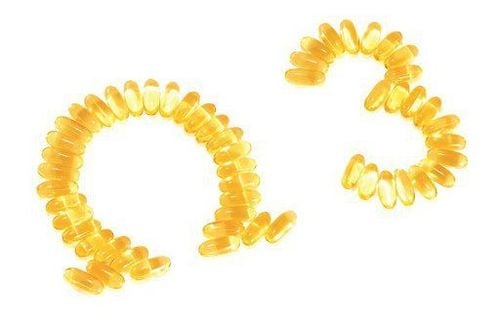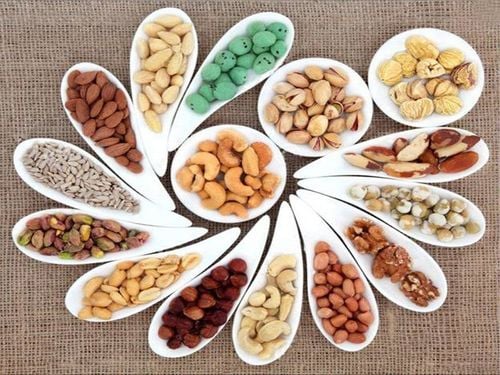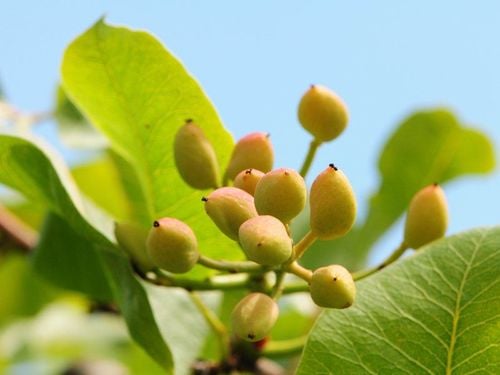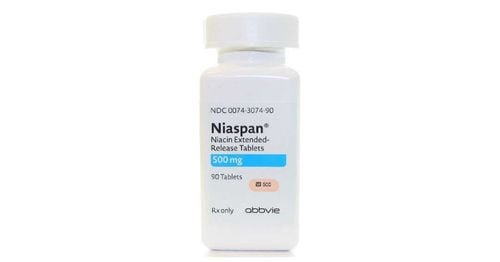This is an automatically translated article.
Peanut or peanut is one of the legume varieties originating from South America. Peanuts are also related to some seeds such as lentils and soybeans, so the nutrition in this nut is also worth paying attention to. So, how many calories do peanuts provide, how much protein does 100g peanuts have and what substances do peanuts have? To clarify the nutritional questions of peanuts, there have been many research and statistical experiments. We will find out together in the article below.1. Nutritional composition of peanuts
In 100g of peanuts, it is estimated that there are 567 calories; 7% water; 25.8 grams of protein ; 16.1 grams of carbs; 4.7 grams of sugar; 8.5 grams of fiber ; 49.2 grams of healthy fats.Fat makes up more than 49% of the nutrition in peanuts. In which, the composition of unsaturated fat accounts for the majority, only a small part is omega 6 and saturated fat.
2. Peanuts are a high-fat food
Peanuts contain a lot of fat, so they are classified as oil seeds and can be pressed for oil. Therefore, the large output of peanuts after being exploited will be used to make peanut oil for cooking.In the composition of peanuts, depending on the variety and season, the fat content can range from 44 - 56 %. Mainly unsaturated fats. This fat is composed mainly of oleic and linoleic acids.
3. How much protein does 100g of peanuts contain?
Peanuts are a rich source of protein for the body. This is a fairly healthy plant protein. In the nutritional composition of peanuts, from 22 to 30% is protein depending on the energy and quality of each type of peanut.The proteins in peanuts are quite diverse. As can be seen, arachin and conarachin appear. However, these are forms of proteins that pose an allergen risk. Allergies are dangerous manifestations that can be life-threatening.
4. How many carbs do peanuts contain?
Peanuts contain very few carbs. In fact, the carb component makes up 13 - 16% of the total. Therefore, the glycemic index of peanuts is quite low. So people with diabetes can use a certain amount to avoid high blood sugar index.5. Peanuts contain many vitamins and minerals
The source of minerals and vitamins is the strong point of peanuts. Biotin in peanuts plays an important role, especially in pregnant women. In addition, copper in peanuts is also a micronutrient that should be added in the diet to help limit the risk of cardiovascular disease. In addition, vitamin B3 in peanuts also helps reduce the risk of heart disease.Folic acid or vitamin B9 is an indispensable substance for pregnant women and fetuses, especially in the first 3 months of pregnancy. Manganese in peanuts is also enough to meet nutritional needs.
In addition, there are vitamin E, Vitamin B, phosphorus and magnesium. These are vitamins and minerals that are important for health. It can be seen that the mineral composition of peanuts is quite diverse and helps significantly improve the health of the body.

Lạc có bao nhiêu calo là thắc mắc của rất nhiều người
6. Other compounds commonly found in plants also appear in peanuts
Peanuts contain many plant compounds that have medicinal properties such as antioxidants. This can be chosen as a healthy source of antioxidants that is not inferior to fruits. However, the majority occurs in live peanuts. According to statistics, peanut kernels contain some of the following substances:p-Coumaric acid. Resveratrol: Reduces risk of heart disease, commonly found in red wine. Isoflavones : Good for health. Phytic acid: May reduce the absorption of iron, perhaps from peanuts and other foods. Phytosterols: Limit the absorption of cholesterol from the digestive tract
7. Can eat peanuts for healthy weight loss
Although peanuts contain more than half fat, they are considered a good food for weight maintenance needs. A small 6-month study in women found that when they ate other fats that were replaced with peanut fats, they lost up to 3 kg. It can be seen that the need to maintain the initial weight has achieved a higher effect than expected.Another study on the ability to control weight of peanuts was carried out every day, adding 89 grams of peanuts to the diet and maintaining it continuously for 2 months. The results showed that the weight was maintained and not increased.
8. Health benefits of peanuts
In addition to the ability to lose weight, peanuts also bring many other health benefits.Improve heart health Cardiovascular is one of the diseases that frequently appear common. Therefore, foods that are good for the heart are always noticed and used. The nutritional content as well as the antioxidants in peanuts can ensure that the risk of cardiovascular diseases is minimized.
Prevention of Gallstones Gallstones have a serious effect on health status and are also detected in the majority of the population. There are a few studies that have shown that eating peanuts reduces the risk of gallstones in both men and women. At the same time, eating peanuts also effectively reduces cholesterol.

100g lạc có chứa 22 - 30% là protein
9. Some unintended effects when eating peanuts need attention
Although peanuts are a nutritious food with many health benefits, it can also be the culprit causing some unwanted symptoms such as:Aflatoxin poisoning Mold is the main culprit leading to food poisoning. poison when eating peanuts. When poisoning, the body will appear some symptoms such as loss of appetite, jaundice or liver problems. Wet areas, especially humid tropical climates, are prone to this disease. Therefore, after harvesting, peanuts need to be kept in good heat and humidity for preservation.
Antinutrients Phytic acid is commonly found in some legumes and grains. They affect the body's ability to absorb nutrients. Therefore, a balanced diet plays an important role in health.
Allergies Allergies to peanuts are rare, but this is a dangerous side effect. When you develop an allergy, there can be an increased risk of being life-threatening. Not only peanuts but also legumes can be allergic when eaten.
Thus, the information about the nutritional composition and effects of peanuts has been explained in the above article. Peanuts are a rich source of nutrients. However, do not eat too much because this food contains many calories that can lead to bloating. In addition, people who are prone to food allergies should not use peanuts.
Please refer to the website: Vinmec.com regularly to update many other useful information.
Please dial HOTLINE for more information or register for an appointment HERE. Download MyVinmec app to make appointments faster and to manage your bookings easily.
Reference article: healthline.com












